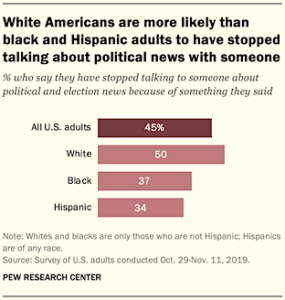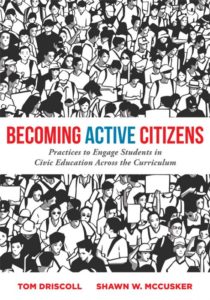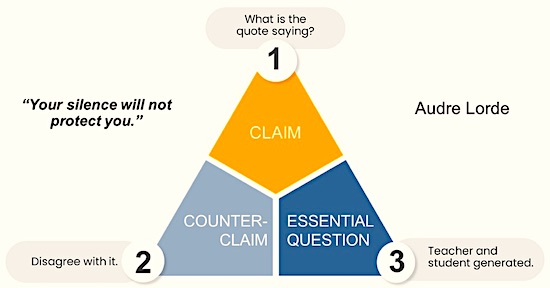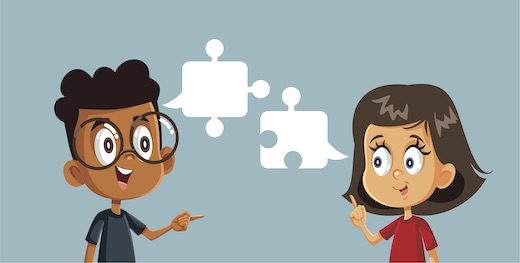Teach Dialogue Skills to Rebuild Our Democracy
Former social studies teacher and school leader Shawn McCusker is co-author of Becoming Active Citizens: Practices to Engage Students in Civic Education Across the Curriculum.
By Shawn W. McCusker

The cause of the disruption was Rosenberg’s thesis. Democracy, he said, cannot survive. It will decline and ultimately fail. He argued that as a society we have increasingly failed to teach people how to navigate the responsibilities that are baked into democracy and as a result this lack of skills has led to the collapse of the moderate center of our society and triggered a desperate shift to right-wing populism.
While I don’t agree with the premise that there is no hope for democracy, I do agree that our failure to prepare our citizens for the responsibilities of democracy is an existential crisis for our country and our educational system.

Not all of this is a problem that schools need to solve, but as teachers we are uniquely positioned to both model and teach the skills that are essential to making sure that Dr. Rosenberg is too pessimistic and that Democracy has a bright future.
What We Can Do: Debate v. Dialogue
The most important thing teachers can do is ensure that our students are capable of engaging in conversations and confident in their beliefs and values while at the same time remaining open to listening to others who they may disagree with.
The most common way of discussing current and controversial topics is the classroom debate. While I enjoy good debates, they might not be accomplishing what we want them to, and unless we take the time to build foundational skills and dispositions they might actually be getting in our way.
Let’s take a look at the values and behaviors that characterize the classroom debate.
In DEBATES we try to:
- Succeed or win
- Look for weakness
- Stress disagreement
- Defend our opinion
- Focus on ‘right’ and ‘wrong’
- Advocate one perspective or opinion
- Search for flaws in logic
- Judge other viewpoints as inferior, invalid or distorted
- Deny other’s feelings
- Listen with a view of countering
- Discount the validity of feelings
- Focus on conflict and difference as advantage
- Disregard relationships
- Use silence to gain advantage
Use these questions to reflect on each item:
- What kind of environment would this create in my classroom?
- What effect would these values have on my students?
- Have I prepared my classes as individuals and as a group for this experience?
Make no mistake, debates are an important skill, but they may not be the best strategy to employ to meet the needs of all students.
- Debates tend to favor outspoken and confident students whether or not they have the best grasp of the facts or an understanding of their opponents.
- The core goal of a debate is to win and to listen to opponents with the intention of countering them to invalidate their arguments.
- Students who are naturally introverted are less likely to engage in the discussion even though they are the ones most likely to listen to and process the arguments being presented.
The Classroom Dialogue Model
A better starting point is to use a “Classroom Dialogue” model to first provide students with an opportunity to find their own voice and to develop skills to listen and evaluate what is shared by their classmates. Take a look at the values and behaviors associated with a classroom dialogue.
In DIALOGUES we try to:
- Broaden our own perspective
- Look for shared meaning
- Find places of agreement
- Express paradox and ambiguity
- Bring out areas of ambivalence
- Allow for and invite differences of opinion and experience
- Ask questions and invite Inquiry
- Discover collective meaning
- Challenge our preconceived notions and those of others
- Explore thoughts and feelings
- Listen without judgment and with a view to understand
- Validate other’s experiences and feelings
- Articulate areas of conflict and difference
- Build relationships
- Honor silence
Consider this list using the same reflection questions shared above. The goal of a dialogue is to gain understanding, challenge our assumptions and express the paradox and ambiguity that exists within a topic.
One simple but powerful model of classroom dialogue was created by Teach Different. This easy-to-use, effective strategy teaches students how to see both sides of an idea and to create questions to further explore the topic.
The TeachDifferent model begins with famous quotes and ask students to create:
- A claim
- A counterclaim
- And an essential question
This exercise conditions students to look at multiple perspectives of their own, and the act of creating essential questions helps them to frame the topic for others. Once the essential questions are created, a teacher can ask the class to answer the essential questions framed by their classmates. This model is effective at any age and can be used on the fly when a topic or question arises.
Another dialogue model is the Constitutional Rights Foundation “Civil Conversation” Model. This model structures the conversation by having students examine a topic individually while documenting their thoughts. Then the teacher conducts the structured dialogue by allowing space and time for students to share their viewpoints with an emphasis on sharing and listening rather than countering viewpoints and challenging the validity of their individual experiences. It concludes with a reflection on what they gained from hearing the perspectives of others.
There are other effective dialogic models available, but what they all have in common is an emphasis on student voice, listening, comprehending opposing views, and validating the lived experiences and values of others even though they may differ from our own. These are skills that we and democracies around the globe need to address the current crisis, prove that Dr. Rosenberg is wrong, and demonstrate that a bright future for democracy is still possible.
References
“The Shocking Paper Predicting the End of Democracy.” 8 Sep 2019, Politico Magazine. Accessed 16 Jun. 2023. Read the full paper here.
“Almost half of Americans have stopped talking politics with someone.” 5 Feb. 2020, Pew Research Center. Accessed 16 Jun 2023.
“Exploring the Differences Between Dialogue, Discussion, and Debate.” PDF. Adapted by Tanya Kachwaha (2002) from Huang-Nissan (1999). Accessed 16 Jun 2023.
“Conducting a Civil Conversation in the Classroom.” PDF. Constitutional Rights Foundation (soon to be Teach Democracy). Accessed 16 Jun 2023.
Other Resources on Dialogues vs. Debates:
- United States Institute for Peace Dialogues vs. Debates
- Strategies for Current Challenges in Dialogue Facilitation via Difficult Dialogues National Resource Center
- Difficult Dialogues via Vanderbilt University
- Classroom Dialogue MESH Guide via Cambridge University
- Classroom Talk and Teaching (Dialogic Teaching) Via University of Oslo
Tools in support of Effective Classroom Dialogues:

In 2006 he was recognized as a finalist for the Golden Apple Award for Excellence in Teaching. In 2016 he was named a Top Trailblazing Educator on Twitter by eSchoolNews.
Shawn has been a keynote and featured speaker at conferences across the US. As a teacher and expert in technology integration, he has lessons and student products featured in THE Journal, Educational Leadership, and the Huffington Post. Follow Shawn on Twitter and read his other MiddleWeb articles here.































Shawn, thanks for these great resources and a framework that will be helpful for so many teachers in this fractured moment! I’ll add one more resource: The Global Education Benchmark Group just came out this month with an excellent short book on encouraging dialogue in class (one of our history teachers was an author!): https://bit.ly/gebgdialogue
I will second Sarah’s compliment. And second your shout out for the resources from Teach Different. Great ways to foster community.